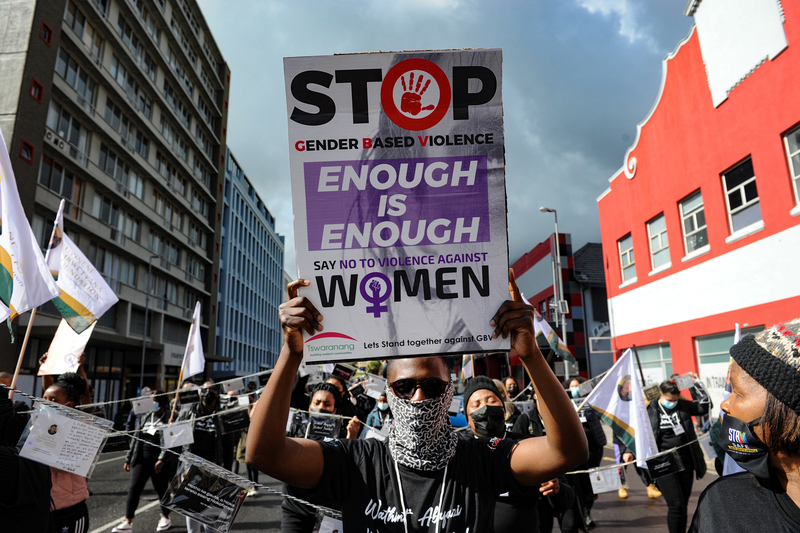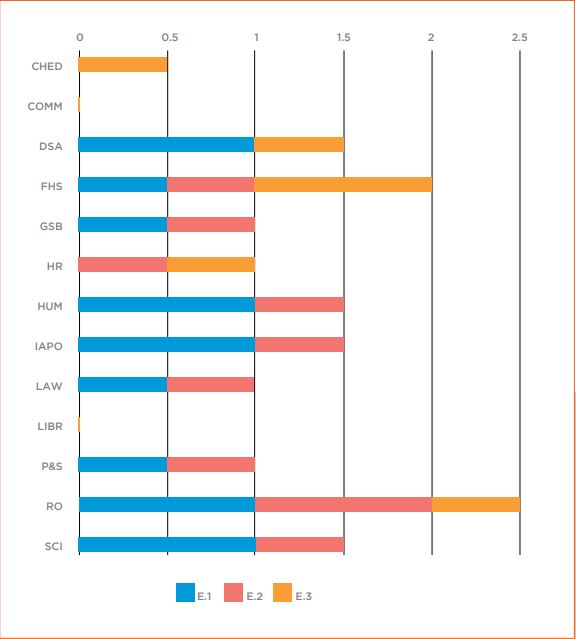Institutional responses to discrimination, harassment and violence
04 November 2022
How is the university practising its zero-tolerance approach to any form of unfair discrimination, harassment, sexual violence and behaviour that demeans others?

What is being tested?
 |
Improving policies | E.1 At least one example of contribution to development, amendment, implementation or dissemination of policies or processes related but not limited to sexual offences, sexual harassment, discrimination and gender discrimination. |
 |
Better access to support | E.2 Students and staff have better access to support and services as survivors of discrimination, harassment or abuse, as well as counsel for alleged perpetrators. |
 |
Increased awareness of support | E.3 Students and staff have better knowledge and awareness of services, support and experiences related to discrimination, harassment or abuse. |
What does the benchmark reveal?
Discrimination, harassment and violence are violations of human rights, dignity and bodily autonomy. While UCT, like other universities, takes a zero-tolerance approach, these problems persist. This benchmark assesses whether departments and faculties have taken basic steps to ensure policy adherence, access to support services for survivors and increased awareness on these issues. In 2021, most entities met less than half of the criteria of this benchmark. In particular, departments did not focus on enabling access to support services, with a small number implementing actions aimed at increasing awareness on issues related to discrimination, harassment or abuse. Since 2019, fewer actions have been reported each year in relation to this benchmark area. In a context where the reports (including the Inclusivity Survey) have highlighted bullying and harassment as an area of concern, it’s key for entities to more actively respond to this benchmark area.
 |
Many departments and faculties report contributing to the development or dissemination of policy in terms of discrimination and harassment. For example, some contributed to the development of the sexual offences and racism policy. |
 |
Few departments or faculties sensitised staff and students to the mechanisms for support and recourse for discrimination, harassment or abuse. Sensitising students and staff often occurred through workshops, training or campaigns in previous years. Support for this benchmark has waned since 2019. |
Which actions contributed to this benchmark?
While 2019 and 2020 focused on the development and release of policies related to sexual misconduct and racism, no new policy developments occurred in 2021. For example, in May 2022 the new anti-racism policy has still not been released. While these policies provide a disciplinary infrastructure in relation to racial and gender discrimination, harassment and violence, other than indicating punishment or discipline, the policies do not respond to themes related to the prevention of and response to these violations. Beyond these institutional efforts, a range of interventions were initiated by entities within UCT. For example:
- Entities reported taking action to enable better access and support to students and staff members experiencing discrimination, harassment and violence. This is primarily done through referring persons to institutional support structures (for example, sharing referral information on websites, in orientation materials and at transformation-focused workshops). Some entities also offer in-house support through faculty psychologists or departmental support groups.
- The UCT-CARES platform was developed to support students during remote teaching and learning. CHED also reports that the platform often refers students in need to institutional services.
- The DSA has developed a document related to sexual offences and sexual harassment in residences. The document has been disseminated through the residence governance structures to support new learning and processes for supporting survivors of sexual and gender-based violence.
- The Humanities faculty, through the Uyinene Mrwetyana Scholarship, raises awareness and supports students who have been involved in advocating against SGBV and gender discrimination.
- The Research Office has established a working group on discrimination, harassment and bullying, and has created infographics that summarise the university’s policies on these themes.
- Supporting the mental health and emotional well-being of students and staff remained important. Some faculties offer specific psychological services, while other entities signposted existing and institutional services, such as the Independent Counselling and Advisory Services (ICAS).
Who contributed to this benchmark?
Five faculties and six non-academic departments contributed to this benchmark.
How effective were the actions?
This benchmark aims to capture how the university is practising a zero-tolerance approach to unfair discrimination, harassment, sexual violence and behaviour that demeans others. The actions contributing to this benchmark focused on disseminating existing policies, offering referral or psychosocial support services, and building knowledge on these themes and topics. However, these actions are small in contrast to the vastness of the problem facing the university. This benchmark received the lowest score, meaning few faculties or departments contributed towards this area of work. In order for actions to contribute meaningfully to this benchmark, they need to clearly prevent, respond to and eradicate racial and gender discrimination, harassment or violence. The current actions in this area are unlikely to do so.
Recommendations
There are strong institutional actions through the OIC, which seeks to dismantle racism and respond to SGBV. Beyond occasional training sessions, these actions do not always connect with faculties and departments. For this benchmark to be achieved, institutional efforts need to better connect with, support and enable actions at a faculty and departmental level. Similarly, faculties and departments need to prioritise actions in this area in 2022.
An example of a good practice
In August 2021 the OIC held a survivor support awareness campaign, “Empowered Through Vulnerability”. The campaign included a series of online discussions on sexual violence and the daily challenges survivors experienced and overcame. The goal was to create unique spaces that include and encourage survivors to take up support after experiencing SGBV, as well as to share insights into the challenges and long-term support survivors require from their social and academic networks. This is the first time that the OIC facilitated an online live event that was open to the public and hosted survivors and professionals with specialised knowledge and skills in the field of SGBV. Each session was facilitated by the OIC Survivor Support Specialist, Yumna Seadat, in conversation with respected panellists who also shared valuable insights. These included the national senior state prosecutor (SGBV) at Wynberg Magistrate’s Court; Rape Crisis counselling co-ordinator and registered counsellor, Shiralee McDonald; survivors from the OIC Survivor Support Group; UCT OIC director, Dr Sianne Alves; UCT Specialised Tribunal for Sexual Offences, Anne Isaac; UCT clinical psychologist, Nazeema Ahmed; and UCT counselling psychologist, Bhavani Krishna.
Transormation special and institutional projects: Supporting Survivors of SGBV
Survivor support: The sexual misconduct policy was rolled out in 2021 through a series of training workshops targeting residence staff, students, student leaders, managers and HODs. Through the training it was evident that there are a number of first responders who are trusted by survivors to provide care and support. In response to this identified need, the OIC developed an Ally Guide to support first responders in the university.
Students led protest actions on SGBV on campus in 2021 after a student was implicated in a GBV case. The protest led to discussions between the South African Students Congress (SASCO), the College of Wardens and the Department of Student Affairs about the need to capacitate students as first responders. The discussions highlighted the importance of challenging harmful SGBV behaviours, statements and “humour” that dehumanises women and marginalised populations.
In 2021, 83 reported incidents were recorded, of which 70 were sexual misconduct cases. The balance were domestic violence cases. Although there was no sexual element in the domestic violence cases, it is important that most of the cases involved previous and/or current partners, and are understood as cases of intimate partner violence. University programmes would benefit from deeper discussions on the forms of intimate partner violence and how to establish and respect boundaries within current and historic relationships. Comparison of 2021 and 2020 data shows an increase in survivors reporting incidents to the OIC for Survivor Support Services only. In 2021, there was a decrease in survivors withdrawing from the process. This may be attributed to the survivor-centred and integrated counselling approach, which reduces secondary trauma and makes the process more manageable when considering survivors’ psychological trauma, safety and academic responsibilities. Click here for the comprehensive Gender Based Violence Report, and the detailed Racial Harassment and Racial Discrimination Report for 2021.
While acknowledging the actions taken in 2021, it’s important to reflect on the changes required to better enable and support students and staff affected by discrimination, harassment and violence. For example, social and behaviour change, and activist programming are needed in order to meaningfully prevent SGBV and racism, and dismantle power structures that enable these forms of violence. These programmes would need to be developed collaboratively between the OIC and transformation agents. Such interventions would need to clearly challenge heteropatriarchy, xenophobic practices, and other forms of intolerance.

Warning sogns
In the first three years of capturing data on the benchmarks, entities reported meeting 40–55% of the Institutional Responses to Discrimination, Harassment and Violence benchmark requirements. In each year, entities reported achieving fewer requirements. This suggests a waning focus on this area of transformation work. It is important for this benchmark to be prioritised by the university.

Sparks
While the above challenges are present, there are several hopeful sparks of change. For example, the focus on referring students to available services using digital and social media platforms allowed for a greater uptake of services at the OIC.

Transformative awakening
Student protest actions on SGBV highlight that students are engaged, interested and committed to making a change in this area. Students should be actively included as equal partners in campaigns and interventions which seek to make a change.
 This work is licensed under a Creative Commons Attribution-NoDerivatives 4.0 International License.
This work is licensed under a Creative Commons Attribution-NoDerivatives 4.0 International License.
Please view the republishing articles page for more information.






